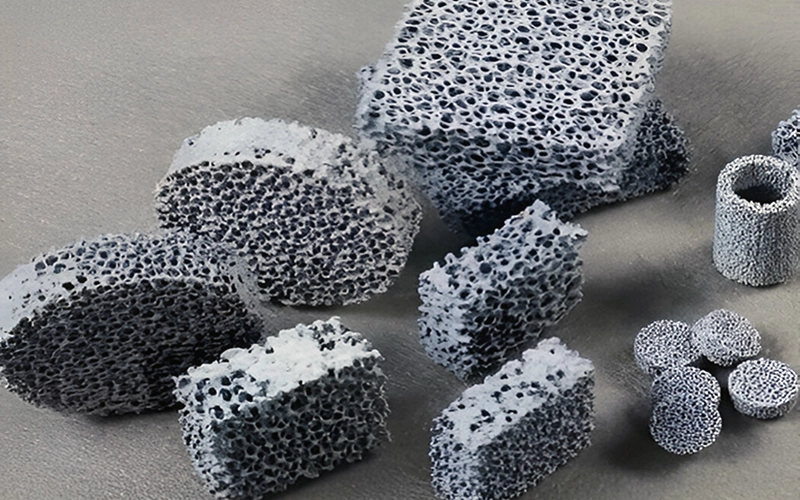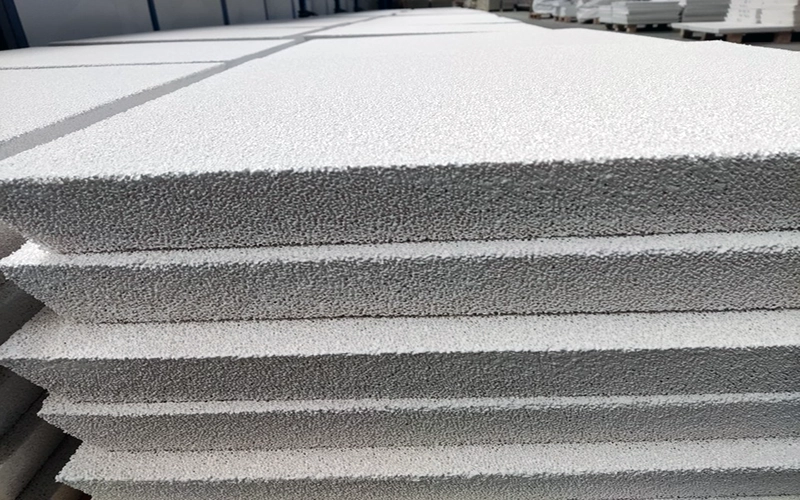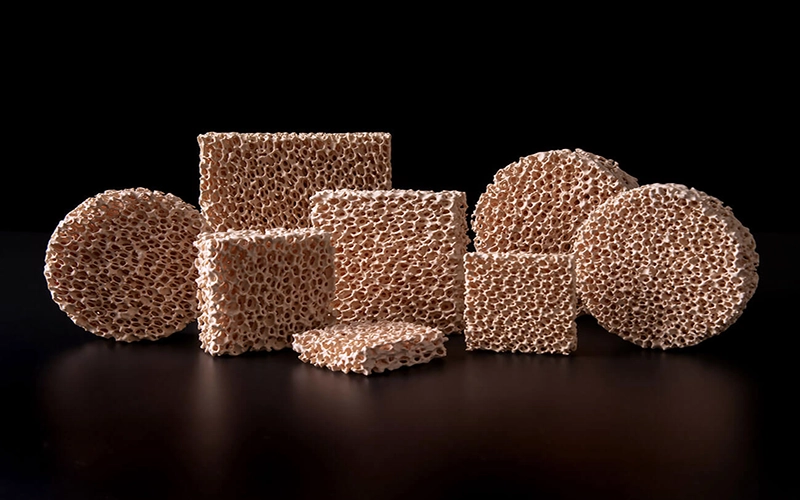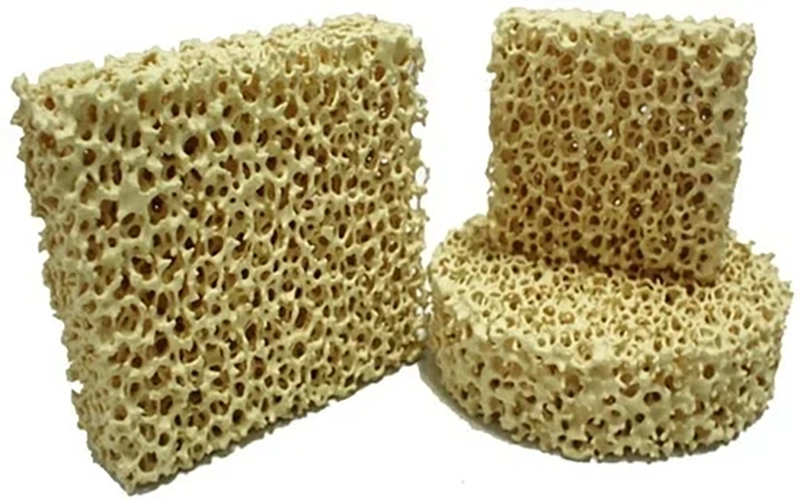Silicon carbide ceramic foam filters are widely recognized for their efficiency and performance in iron casting applications. These filters are specifically engineered to meet the rigorous demands of modern foundries, providing reliable filtration solutions that significantly improve the quality of various types of iron castings. Whether used in the production of nodular graphite iron, grey iron, or tenacity iron castings, these filters offer superior filtration capability, durability, and thermal resistance.
One of the primary functions of silicon carbide ceramic foam filters is to purify molten iron during the casting process. As molten metal flows through the porous structure of the filter, impurities, slag, and non-metallic inclusions are effectively trapped, preventing them from entering the final mold. This results in cleaner, higher-quality castings with fewer defects. The reduction in foreign residues not only enhances the structural integrity and surface finish of the cast product but also decreases the likelihood of rework or scrap, leading to better production efficiency and cost savings.
These filters are also highly effective in reducing the turbulence of molten iron at the feeder mouth. By calming the metal flow, they help ensure a more stable and consistent filling of the mold cavity, which contributes to the overall reliability of the casting process. This reduction in turbulence minimizes the chances of air entrapment and mold erosion, further improving the dimensional accuracy and mechanical properties of the final product.
In addition to their filtration capabilities, silicon carbide ceramic foam filters are built to withstand the harsh and dynamic environment within the mold. They demonstrate exceptional thermal shock resistance, allowing them to endure rapid temperature changes without cracking or deforming. Their refractoriness, rated at 1500°C, ensures stability and performance even under extreme heat conditions. Moreover, with a porosity range of 80–90% and bore densities available from 4 to 60 pores per inch (ppi), these filters can be tailored to match specific flow and filtration requirements.
From a mechanical standpoint, these filters offer impressive strength, featuring a bending strength of 0.8 MPa and a compressive strength of 0.9 MPa. These properties allow the filters to maintain their structural integrity during handling and throughout the casting process.

Key benefits of using silicon carbide ceramic foam filters in iron casting include:
Effective removal of impurities from molten iron, resulting in cleaner castings.
Enhanced casting quality, with improved mechanical properties and surface finishes.
Reduced inclusions and rework, which lowers overall production costs.
Stable molding conditions, due to controlled and less turbulent metal flow.
High resistance to thermal and mechanical stress, ensuring durability during use.
In conclusion, silicon carbide ceramic foam filters are a vital component in achieving high-performance iron castings. Their advanced material properties and functional benefits make them an indispensable tool for foundries aiming to improve casting quality, reduce defects, and streamline their manufacturing process.

Alumina ceramic foam filters are essential components in the casting of aluminum alloys and other non-ferrous metals. Designed to enhance the quality of castings, these filters play a crucial role in refining the final structure of crystalloid formations, improving mechanical properties, and ensuring a more efficient and stable casting process. By effectively filtering out impurities and inclusions from molten metal, alumina ceramic foam filters contribute to superior casting performance, reduced defects, and increased production efficiency.
The primary purpose of alumina ceramic foam filters is to remove unwanted impurities and solid particles from molten metal before it enters the mold. This purification process results in cleaner and higher-quality metal castings with enhanced mechanical strength and surface finish. Without proper filtration, impurities such as oxides, slag, and non-metallic inclusions can compromise the structural integrity of the final product, leading to defects and inconsistencies.
Another key advantage of using these filters is their ability to refine the crystalline structure of aluminum alloys and other non-ferrous metals. By controlling the solidification process, alumina ceramic foam filters help in achieving a more uniform and refined grain structure, which directly enhances the mechanical properties of the casting. This results in better durability, improved wear resistance, and increased overall performance of the cast components.
Furthermore, these filters exhibit excellent thermal stability and mechanical strength, making them suitable for the demanding conditions of metal casting. They can withstand high temperatures up to 1100°C, making them reliable for applications in aluminum and other non-ferrous alloy foundries. Their thermal shock resistance rating of 6 ensures that they can endure rapid temperature changes without cracking or breaking, thus maintaining their effectiveness throughout the casting process.
Alumina ceramic foam filters are available in various porosities and densities to match different casting requirements. Their technical properties include:
Alumina ceramic foam filters are an indispensable solution for foundries looking to improve the quality and efficiency of their non-ferrous alloy castings. Their ability to filter impurities, refine crystalloid structures, enhance machine function, and stabilize molten metal flow makes them an essential tool in the casting industry. With high thermal resistance, excellent mechanical strength, and optimized porosity, these filters contribute significantly to producing defect-free, high-performance metal castings.
By integrating alumina ceramic foam filters into the casting process, manufacturers can achieve better casting reliability, reduced waste, and increased production efficiency, ensuring that their final products meet the highest industry standards.
In addition to structural improvement, alumina ceramic foam filters enhance machine function by providing a smoother and more controlled flow of molten metal. This minimizes turbulence, reduces air entrapment, and ensures even filling of the mold cavity. As a result, casting defects such as porosity and shrinkage are significantly minimized, leading to higher precision and better dimensional accuracy.
Magnesia ceramic foam filters are specifically designed to meet the unique challenges associated with the casting of magnesium alloys. Magnesium alloys are highly reactive compared to other non-ferrous metals, which makes their filtration process more complex. Traditional ceramic filters often fail in this application because molten magnesium can react with their base materials, causing rapid degradation and contamination of the metal. To address this issue, magnesia ceramic foam filters are being developed as a specialized solution to effectively purify magnesium alloy melts, improving the overall quality and performance of the final casting.
Magnesium alloys are widely used in industries such as aerospace, automotive, and electronics due to their lightweight properties, excellent strength-to-weight ratio, and good corrosion resistance. However, maintaining the purity of molten magnesium during casting is a significant challenge. Without proper filtration, impurities such as oxides, inclusions, and other contaminants can weaken the structural integrity of the final product, leading to defects, mechanical failures, and higher rejection rates.
Magnesia ceramic foam filters are specifically designed to handle these challenges. They effectively remove unwanted impurities, resulting in cleaner and higher-quality magnesium alloy castings. By purging the magnesium alloy solution, these filters enhance the metal’s internal quality, ensuring better mechanical properties and improved performance in demanding applications.
Magnesia ceramic foam filters are available in various porosities and densities to match different casting requirements.

Their technical properties include:
Bore Density (PPI): 4-60
Porosity (%): 80-90
Refractoriness (°C): 1100
Bending Strength (MPa): 0.6
Compression Strength (MPa): 0.8
Thermal Shock Resistance: 6
Magnesia ceramic foam filters represent an innovative advancement in the field of magnesium alloy casting. Their ability to effectively filter molten magnesium while resisting rapid degradation sets them apart from conventional filtration materials. By ensuring a purer metal solution, these filters contribute to improved mechanical properties, better casting efficiency, and reduced production waste.

Zirconia ceramic foam filters are an essential component in the steel casting industry, specifically designed to enhance the purity and quality of molten steel. These filters are widely used for purging solutions in carbon steel, alloy steel, and stainless steel casting processes. Their superior thermal resistance, mechanical strength, and chemical stability enable them to endure the demanding conditions of steel casting while effectively removing impurities and reducing defects.
Steel casting involves high temperatures and complex metallurgical reactions, which can introduce contaminants such as slag, non-metallic inclusions, and oxides into the molten metal. These impurities can weaken the structural integrity of the final cast product, leading to defects such as cracks, inclusions, and porosity. Zirconia ceramic foam filters are designed to address these challenges by efficiently capturing foreign materials and impurities before they enter the mold.
In aaddition to purifying molten steel, these filters also help reduce turbulence during the casting process. Excessive turbulence can cause oxidation and the formation of additional impurities, compromising the quality of the final product. By stabilizing the flow of molten metal, zirconia ceramic foam filters minimize the risk of secondary oxidation and ensure a smoother casting process.
Zirconia ceramic foam filters are available in various porosities and densities to suit different steel casting applications. Their key technical properties include:
Bore Density (PPI): 4-60
Porosity (%): 80-90
Refractoriness (°C): 1700
Bending Strength (MPa): 0.8-1.0
Compression Strength (MPa): 1.0-1.2
Thermal Shock Resistance: 6
Zirconia ceramic foam filters are a crucial innovation in steel casting, providing an effective solution for improving the purity and mechanical properties of steel castings. Their ability to filter out foreign matter, reduce oxidation-related flaws, and stabilize molten metal flow leads to higher-quality castings with fewer defects.
Manufacturers using zirconia ceramic foam filters benefit from increased efficiency, reduced rejection rates, and improved final product quality. As the demand for high-performance steel components continues to grow in industries such as automotive, aerospace, and heavy machinery, these filters remain an indispensable tool for ensuring precision, reliability, and superior steel casting results.